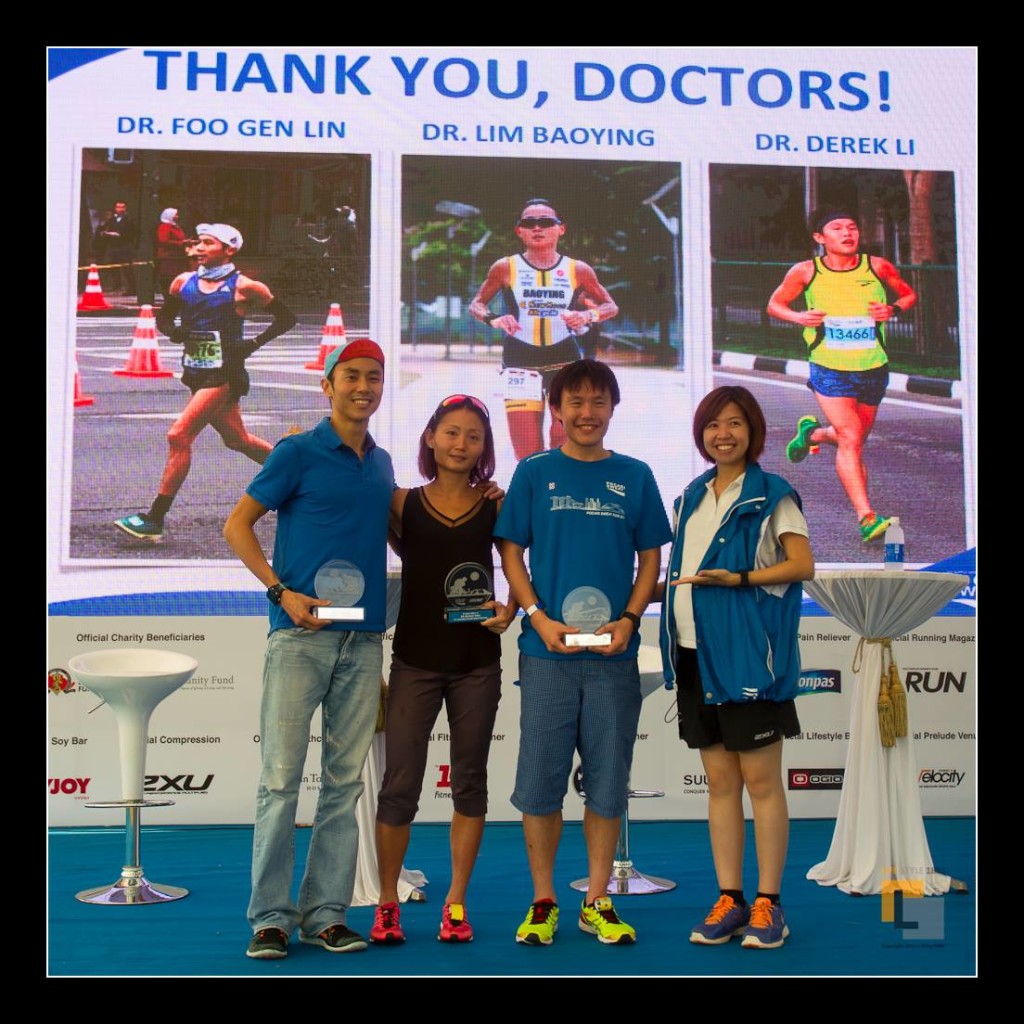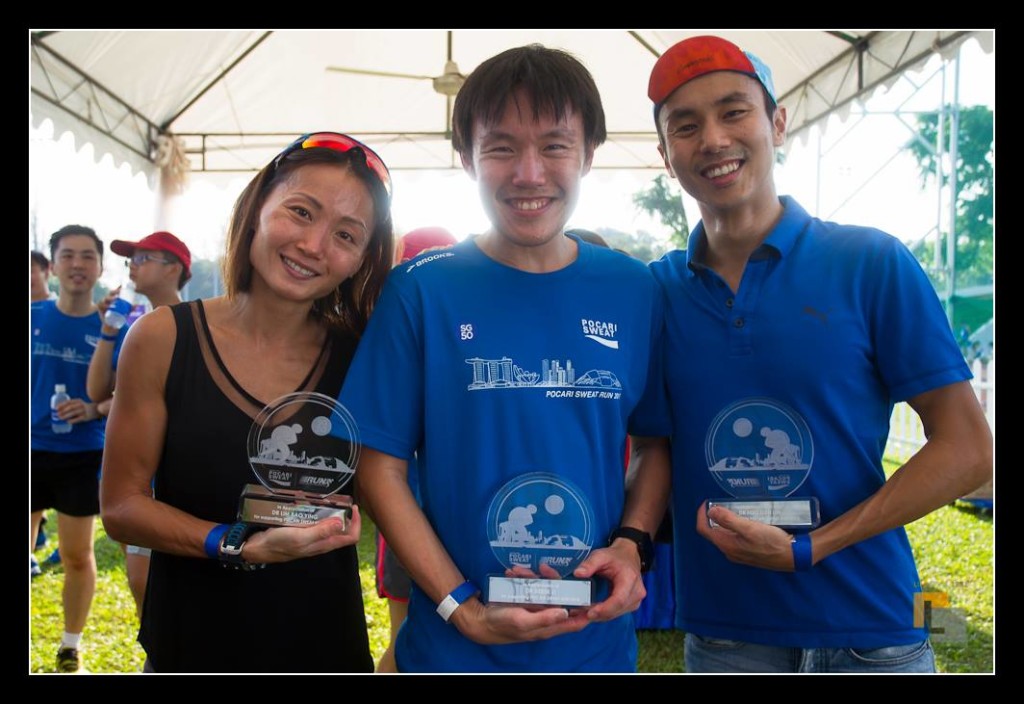They are not only certified medical doctors, but are also accomplished athletes in their own right.
Dr Foo Gen Lin, who is a Senior Registrar at the Department of Orthopaedic Surgery at Tan Tock Seng Hospital, has a marathon personal best of 2 hours and 48 minutes, set at the Tokyo Marathon this year.

The doctors who were speaking at the panel discussion. From left to right: Dr Gen Lin Foo, Dr Lim Baoying, Dr Derek Li and Pocari Sweat’s Puspita Winawati.
Photo credit: Ming Ham.
Dr Lim Baoying, a Resident Physician at the Department of Changi Sports Medical Centre, Changi General Hospital, has completed not only a number of full marathons, but also duathlons and triathlons.
Dr Derek Li is a family physician at the Raffles Medical Group and his running achievements include a personal best timing of 2 hours 42 minutes and 1 second, set at the Boston Marathon 2014. He also completed the recent Seoul Marathon this year in 2 hours 49 minutes and 56 seconds.
At the end of the Pocari Sweat Run 2015 yesterday, these three doctors shared some tips about hydration and nutrition for runners during a short panel discussion.
Hydrating yourself is very important
According to Dr Foo, hydrating yourself with water and isotonic beverages after a run is very important. He said, “First and foremost, you must hydrate yourself with both water and isotonic drinks. Water alone is not sufficient, because you lose salts in addition to water in your sweat. This is especially so for a run that is 10km or more.”

Dr Foo Gen Lin
Photo credit: Ming Ham
Added Dr Li, “Personally, I lose two kilograms whenever I run 10km race. That is equivalent to two litres of water. So if you sweat as much as me, you need to replenish your body’s water supply as fast as possible. I always aim to drink within the first 30 minutes of my run – and target 150 per cent water loss over 24 hours after the run. And when I run, I make sure I carry a bottle of water with me too.”
Over-hydration can be fatal
The three doctors also added that proper hydration can really affect running performance. However on the flip side, it is important not to over-hydrate either. Said Dr Foo, “You should hydrate, but not over-hydrate. During a marathon three years ago, I drank too much water during the race and I felt very bloated throughout the whole race as a result. While you should drink at regular intervals, you should take in small quantities. There is no hard and fast formula though. The best advice I can give, is to listen to your body’s thirst signals to gauge how much to drink.”

Dr Derek Li.
Photo credit: Ming Ham
Added Dr Lim, “Slower runners who have the tendency to stop and drink water at every hydration station are especially susceptible to over-hydration. And drinking too much can be fatal – it can result in hyponatremia. This actually happened at the recent Ironman Frankfurt when a 30-year-old athlete died from the condition. He had just been drinking water and did not ingest any electrolytes or salts during the triathlon. This diluted his blood levels of sodium and his brain swelled, causing death. So taking water alone will not replace what you are losing through your sweat.”
Pre-race Nutrition
Besides hydrating yourself properly during the race, these doctors also advised that you should take foods that are easily digestible in the days leading up to the race – so that you will have the energy to last the distance on race day. Said Dr Li, “I try and stick to refined carbs that are easily digestible. For example, I take plenty of fruits, white bread and white rice. I also have foods that are high in water content, such as watermelons, because this helps to constantly rehydrate the body. It also digests much faster and prevents constipation in the days leading up to the race.”

Dr Lim Baoying
Photo credit: Ming Ham
After the race though, it is quite permissible to eat anything that you want. Said Dr Foo, “There is nothing wrong with eating char kway teow after a run.”
Tapering before a race
Apart from just eating before the race, endurance runners should also practise tapering, which is when you decrease your physical activity in the weeks leading up to the race.
Explained Dr Lim, “Tapering is when you drop down the intensity of your workout. For a marathon, this is about two to three weeks before the race so that your body can get enough rest to repair itself in time for the long run. So during tapering, I would only run about 10kms at my intended marathon pace, and at the same time, increase my intake of carbohydrates for energy.”
Added Dr Foo, “Basically, tapering is an excuse for me to get fat and lazy. But in terms of my food intake, I would not sway too much from my normal food routine. Many people suggest taking pasta before a marathon but if your body is not used to eating pasta, I would not recommend it. Stick to the carbohydrates that you are familiar with such as rice or bread. Also, you will be needing to consume energy gels to keep going during the marathon anyway, as your body cannot store that much carbohydrates in the first place.”

The three running doctors.
Photo credit: Ming Ham
Cramps during a long run
But Dr Foo added too, that no amount of carbohydrates can prevent cramps during a long run such as a marathon. He explained, “If we could find a universal cause for cramps, we would be millionaires. A lack of salts and energy levels though, is one reason that will cause cramps. But lack of training also causes cramps as the muscles will be overworked and they will hit breaking point during the race – so they cramp up. Also, overheating of the body causes cramps too, especially so when running in hot weather.”
He continued, “Different people respond to cramps in different ways though and there is no hard and fast rule here either. For example, some people think salt tablets are a miracle cure and the cramps stop the moment they take it. But to others, salt tablets do not make any difference – especially when the cramps are a result of under-training. So try different things when you run into cramps and see what solution works best for your body.”
Click here for my Pocari Sweat Run race review.

Leave a Comment